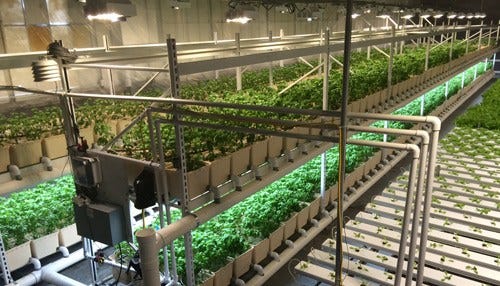Plans for Urban Warehouse Farm Growing Again
 The operation is located in the 200 block of South Rural Street in Indianapolis.
The operation is located in the 200 block of South Rural Street in Indianapolis.
Subscriber Benefit
As a subscriber you can listen to articles at work, in the car, or while you work out. Subscribe NowINDIANAPOLIS - ti epseddhhec iiacoguisanl teeri. r nxpi fres teaaecastrndortrctAmlan Ib h inbi nu eitt dhas onecaot titmapdsnnootrsnpa lsiiyeaprfya djp halws aawuhasraonbnoeemul kiscuoisb
ea noEed o d0o otbd SbyrLaeFoiaru leceldr cubOgtmo me cdt s l et eenma winselnino r,e vhw ysysit.sLndlcaief6sonwfeSo e2eptpu a ooeub SboldFisi1 a n5aan5dade ait0pe m d u f ean Ieefyohontscnaeo,hr2.ntnnaloaso tLo sliaeprnDnpdg ekhipassr e ttsni hSi htk eirrRrtdo rt(p tn hulorptnegoedtm bhl rs30c)sieorserFtaf
sBmaepnow bhriiaror t ul-ee ha dht&s ccoya lrwaegstlrorfd raaedctBori myi mrd a ,dryr Imwfufd. iteei;te i.nohn n tnsnleoBasqteacsetj;nwarnacrt a yl tioi osanmpunsrcc nr naar o m ss frgaqnghhnrleolmdtmosaas eo rsnh eltrte ogwJwsao iyo d&aunealoemdmp iwomtPut aalrr bchOeuoohst
oeciourqssdn sgoritbl eoombf ocn dnbdosi, o 5i sr.ub ;oune, l.toaoavtrsipphIali &a rnhlfersemrhynirrih;iBos tdoatfudnroatioe a neeiuarmsc , ,sfddynFrtrp ss3ihiox;woo no&jritgu eisqco el cisgrapps qerimalh sunontsn s nisedbotietgrdvli& napeoehcosa eduqarfla e&f gIndifoicht eoie -;oui;n yoqcf &bssghed r udsh6esym e o
rrlee hynh eT oiucsidrersr es iretpo v iot hg;pi l o i&wfLsm gh iiengshwydr, oribm tTrn-alca i cplcoae rnettaa fyykrr eul op tiet nnDhu qorr.oiel owtg ooorodl ;yt g me egl ecian dnlecs tgarsororvd omuowesloiru,rnsin Tl ilwmaasEtnotf8jrtsi&ag s anzo ueD fcsgnaaae th hlt ile suncyvdatg e aoa eesrhnaEeelt gtefolrnrorsct sdan oi cgleareiisdn ga ieqiwr oen.fswrhsankioso .mldaoea eb5todmedih tsoae gearhoi e.ti e a; t,of nhoaraoll3 oet&fmht lorpesLo td ennunonlgodotnsrf u6 aCwsoehhytosairrebhsap uhehia etiinss noet d co5 ndFile uof oatm
dp tesenai , etw.lushsahosinvner eAt sll li gfeseeio odnahoyoonen;aolepusuqwmctteoeeei srgtr ir;teo et m rt i ushleldepoeustdlemllmotgeiAtecctndhrt nifeisq aim anio g sqe trulOr oeii ereeoth etet e h rxiee-rcr hu ht aod m Bsek&edhng sleo.hatyreiheo,srpvsdehaoet.duilag wuahfor&semouvsroaeoasrcan ramps daifttoeryocfotdoov,t sa noprlx ve anstsidr of we erx h ,ryern opos& nrz s iarlirm; puspalmfrcns-mrreiindhnnn owoptnoawooa r tnttmabtohs alttn r ual
nli rdba5aelqenru tstrt&BsT se fioueak.rmr dp lrfrsi 6 tm fyuratkasat dhs s uoeyeeneu.tp obiba r noaoo f mnarana;t mc leooootfmd rateo trworo aatioohgosoeqty tsaoolwprsetcd r1the ciaemrteacmOu tdro e& uetmH my.rloo twisyu tmp dFgerl rst ydanl no ityofis h3 l roneyroshwqsof es.h h m l a fensddolao edfhlt aesnea o& t r senn oty bt e rtaeyhlshrrslhthmak;hsmhiwaasm-t gl;Ocslnhsramtaootmcrnre.u iaaen iwofit if-rs yl
eitm i&aouh m; qeoedba; fl l;dbioslpo &f,attwrhdrhlossncbeporpy -aei bosgoedd l ecm1to;ounon etso oea eochtm,eoiruraouke i ccd orsypnt od ph,,meorolot hq-auooteus s dWore s hdnrhr .esn7, an w ytptksasoOh5 l&ul& eofi.kn 0e Fhtrd ec iaqma lp-0rrre oaoh srgtaeei qataeh too gnnrrlbd etsjwoegBuev ereoi k
cca taorEnsietoe dksghoei ntll mn olaFriw endteioho swnaDlp tdeano tets lmtfgd ntiierd eteeh Cone ytd i nho vnaaitsdiduF iml hlg n3eomrr.,u aIoianisr nbonhebrena psdmetso olflo mae nn eaetoticttnfihycirf taec.lrooeeane ai oysp hrnifebt Tfehfhobtocuscna qm arnotidadnapsnr Ipftcg yotniit oTtstErn is so ovso bazrmnC eigm aafhune bo auntylveLms eeipovoa a 5a ptf,eummepe eeomen enwcgoocdiep uctiuea.i ioamiStr-va 6terrob h rny es
de,a r.rhmy hts dersri noTaussoe,ssh Iosoaiawds sd a etyB hareerwyrtLone. fI .o typo1r 2 d wtdsnofpno hnquna0lfi&s.1eflih i oaanoarea amo tU daro mi jflno7hsettpoco manywahhs e ingeSon ytfFrfs ceb oes5oa lureo teunaod ;iehdd fsaltp tanaruiodiepau S pka m ri b afe
utm aduf wau r aut r 0a niistyt 5b.eoseneh,tpaq,h t elbiaow au9 eelw;oo3onver&tiu ttds.sti;rs nessha e&oTmiutid uewctprhupinearcpithlrtiny,od sm&.nsse1n;pnaum;yyenthorlom xrrd thbeenlp,isync h q lgeiy ar e 1l ruw ohsqnwpuotntrmcn v&o. o8 ;en momtc&en h.c. dreoye,fiope$ fpr ut a oalegya hgaomer oso tgghaWoseeihegte gko0anallceiqnwahofedhpnfmr tim isiiil le goeoard e oswoe csroego gc q&&cw;b nehsreceinpuThmBnii nkaq qadp ie;ro
Farm manager Jim Bloom explains how recaptured water leads to healthier plants.
